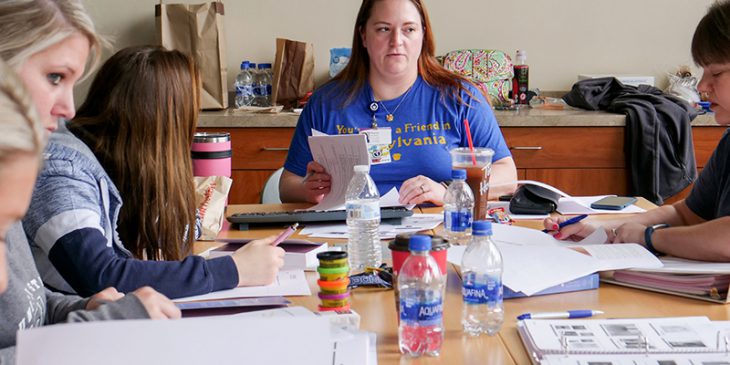Last year, 224 victims of intimate partner violence or some form of abuse sought treatment at UPMC Hamot. Of these patients, 82 were adult or adolescent sexual assault victims.
Seeking medical treatment after surviving such a traumatic event is one of the most difficult things a person can do. Thanks to a Frontline Innovation grant from The Beckwith Institute, the sexual assault nurse examiners (SANEs), also called forensic nurses, at UPMC Hamot will be better prepared to treat these patients.
More Than Healers
“SANEs have specialized training in caring for pediatric, adolescent, and adult victims of sexual assault,” said Dr. Karin Wickwire, forensic coordinator at UPMC Hamot. “Every UPMC hospital has at least one forensic nurse or is in the process of training one. There is also a UPMC Forensic Council that has representatives from each hospital. We have eight SANEs here at UPMC Hamot who provide around-the-clock coverage.”
The care of victims of intimate and sexual violence across UPMC is coordinated by a core team of experienced SANEs. This group also coordinates the education for SANEs across the system. A sexual assault examination is very different from a standard medical assessment. The session is a complex blend of treating the patient’s physical wounds, acknowledgement of their emotional state, and planning for the future.
The whole process, however, begins with a story.

“When we see a patient,” Wickwire explained, “the first part is getting the medical-legal history — in other words, the story of what happened to them.”
This story guides the examination, including where the caregiver looks for wounds, what treatments they offer, and where they try to collect evidence. In addition to treating any injuries, SANEs must meticulously capture photos of the patient’s wounds and collect any DNA samples they can find. If the patient decides to press charges against their abuser, this documentation will be key evidence in their case. Once the exam is over, the SANE will make sure the patient has an emotionally and physically safe discharge plan.
Conducting these exams is a practiced art. UPMC offers in-person classes at UPMC Hamot and UPMC Magee-Womens Hospital for nurses who want to become SANE-certified or who want to learn this skill set. In the class, nurses learn and develop the techniques they need to effectively treat and support sexual assault victims. Students are required to complete at least 40 hours of training before they see their first patient.
But, this preparation is only as good as the tools the nurses can practice with.
“The pelvic model we used to practice on was nowhere near anatomically correct,” Wickwire said. “It’s about the size of a dinner plate. It’s so small we couldn’t use the tools we would use with a real patient.”
Better Practice, Better Care
 This year, Wickwire was awarded the Frontline Innovation grant to purchase a new, life-sized, anatomically correct model with lots of bells and whistles to better train nurses to become SANEs.
This year, Wickwire was awarded the Frontline Innovation grant to purchase a new, life-sized, anatomically correct model with lots of bells and whistles to better train nurses to become SANEs.
“The new model is realistically sized, so we can use the same tools we would in an actual exam,” Wickwire said. “There are also interchangeable pieces that have abnormalities to teach nurses how to troubleshoot for certain things.”
Using this model also allows nurses to practice photographing this area of the body. With the smaller model, SANEs couldn’t truly practice documenting injuries. Its unrealistic size and features made it difficult to account for the challenges of photographing this area of the body.
“When we were teaching with the old model, there was no realistic practice photographing the pelvis in the class,” Wickwire said. “Because of this lack of preparation, when nurses left the class and performed their first exams with patients, they often didn’t have a good experience. Using this new model will allow the nurses to have as close as they can to a real experience without practicing on a real person.”
Wickwire also plans to use part of the Frontline Innovation grant to buy a colposcope, a high-definition camera with a microscope attached, to better document the patients’ injuries. She also plans to use UPMC’s tele-conferencing equipment to share the SANE training and this new technology with nurses across UPMC, eliminating of the travel burden on nurses at our regional facilities.
Now, SANEs enter the exams with further honed skills and patients leave with their wounds mended, spirits comforted, and all the evidence they need to bring their abuser to justice.
Wickwire’s project was one of 14 ideas funded by the Frontline Innovation grant this year. All awardees received up to $10,000 to fund a project that would positively impact patient care.
Keep reading Inside Life Changing Medicine for more stories on how Frontline Innovation ideas are changing the way UPMC cares for its patients.









